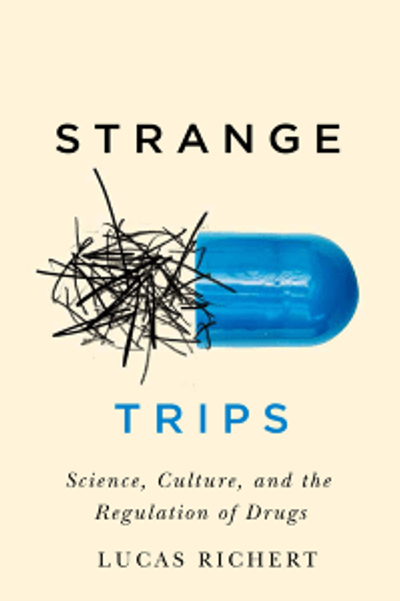Points Interview: Lucas Richert
- Points Editors
- Mar 14, 2019
- 2 min read
Updated: Aug 29, 2023
Today’s Points Interview features Dr. Lucas Richert, George Urdang Chair in the History of Pharmacy at the University of Wisconsin, Madison, and author of the newly-released Strange Trips: Science, Culture, and the Regulation of Drugs (McGill-Queen’s University Press, 2019). Richert is also a co-editor of the ADHS’s official journal, Social History of Alcohol and Drugs.

Strange Trips is about “dangerous drugs and magic bullets,” terms that many of us have heard and used. The book investigates how and why these labels (may) change over time. Drugs and pharmaceuticals are far from fixed entities that exist in hermetically sealed bubbles! So I use a number of substances (such as heroin, LSD, cannabis, and others) to challenge the idea that scientific and medical understandings alone determine perceptions of drugs in the modern era. And I make the case that a complex negotiation is happening between medico-scientific knowledge and culture.
In 2019, I feel like we’re operating in an environment where drug policies and regulations are more fluid than ever before. At least as far as I can remember. Strange Trips offers a background for discussions surrounding medical cannabis or the opioid crisis in the present.
What do you think a bunch of alcohol and drug historians might find particularly interesting about your book?
I don’t narrate a linear history of a single substance. Instead, I spotlight several different drugs and put them in dialogue with each other. I definitely enjoy singular biographies of substances or pharmaceuticals, don’t get me wrong. But I reckon that blended analyses will be of value to the historiography as well.
Now that the hard part is over, what is the thing YOU find most interesting about your book?
The character studies. The subtler moments. The finer details. Also: playing with the content and the form of an academic book. Y’know, we have to take pleasure in the writing process.
Another thing I find intriguing about the book at this moment is the evolution: what was cut and why. Where (and who) I was when I started, versus where (and who) I am now. Silly, but true.
Every research project leaves some stones unturned. What stone are you most curious to see turned over soon?
For sure. There are always more avenues to explore. I look forward to seeing the results of various ongoing projects out there: pharmaceuticals and sexual politics (think LSD and conversion therapy); so-called lifestyle drugs; and stimulant use in Asia. I try and keep my finger on the pulse. This might also be a useful opportunity to invite submissions to Social History of Alcohol and Drugs: An Interdisciplinary Journal, which just moved to the University of Chicago Press.
BONUS QUESTION: In an audio version of the book, who should provide the narration?
That’s a difficult one to answer. For the English language version, I’ll pick two: Dame Judi Dench and Peter Capaldi. I’d have to think more carefully about other languages.

David Herzberg, Nancy Campbell, and Lucas Richert (L-R), the co-editors of the Social History of Alcohol and Drugs journal
